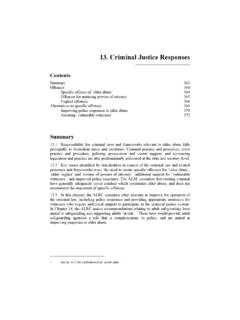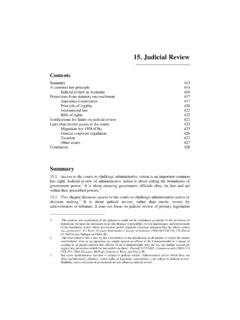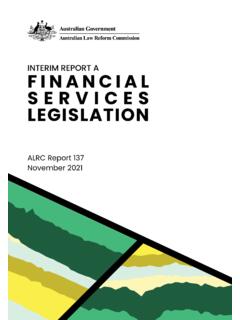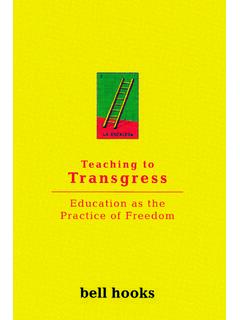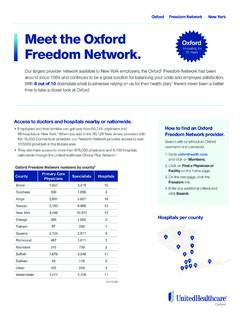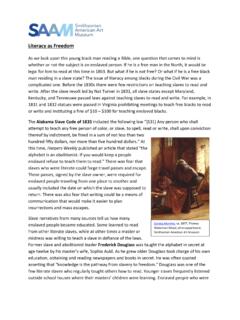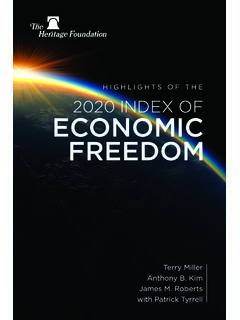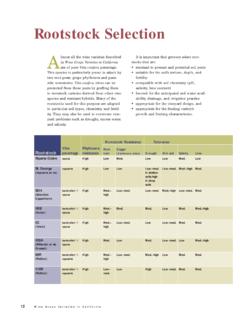Transcription of 4. Freedom of Speech - Australian Law Reform Commission
1 4. Freedom of SpeechContentsSummary77 The common law79 Protections from statutory encroachment80 Australian Constitution80 Principle of legality83 International law84 Bills of rights85 Justifications for limits on Freedom of speech86 Legitimate objectives86 Balancing rights and interests89 Laws that interfere with Freedom of speech90 Criminal laws91 Secrecy laws98 Court and tribunal orders108 Privilege and contempt laws108 Anti-discrimination laws111 Racial Discrimination Act112 Media, broadcasting and communications laws120 Information laws122 Intellectual property laws123 Other of Speech has been described as the freedompar excellence; forwithout it, no other Freedom could survive .1 Freedom of Speech is closely linked toother fundamental freedoms which reflect.
2 What it is to be human: freedoms ofreligion, thought, and conscience . chapter discusses the source and rationale of the common law right offreedom of Speech ;how this right is protected from statutory encroachment; and whenlaws that interfere with Freedom of Speech may be considered justified, including byreference to the concept of Campbell and Harry Whitmore, Freedom in Australia (Sydney University Press, 1966) Barendt, Freedom of Speech (Oxford University Press, 2nd ed, 2007) Rights and Speech and free expression are understood to be integral aspects of aperson s right of self-development and fulfilment. The Freedom is intrinsicallyimportant, and also serves a number of broad objectives:First, it promotes the self-fulfilment of individuals in society.
3 Secondly, in the famouswords of Holmes J (echoing John Stuart Mill), the best test of truth is the power ofthe thought to get itself accepted in the competition of the market . Thirdly, freedomof Speech is the lifeblood of democracy. The free flow of information and ideasinforms political debate. It is a safety valve: people are more ready to accept decisionsthat go against them if they can in principle seek to influence them. It acts as a brakeon the abuse of power by public officials. It facilitates the exposure of errors in thegovernance and administration of justice of the the same time, it is widely recognised that Freedom of Speech is not Australia, legislation prohibits, or renders unlawful, Speech or expression in manydifferent contexts.
4 Some limitations on Speech have long been recognised by thecommon law itself, such as obscenity and sedition, defamation, blasphemy, incitement,and passing Commonwealth laws may be seen as interfering with Freedom ofspeech and expression. There are, for example, more than 500 government secrecyprovisions alone. In the area of commercial and corporate regulation, a range ofintellectual property, media, broadcasting and telecommunications laws restrict thecontent of publications, broadcasts, advertising and other media products. In thecontext of workplace relations, anti-discrimination law including the generalprotections provisions of theFair Work Act2009 (Cth) prohibit certain forms ofspeech and areas identified as being of concern are: various counter-terrorism offences provided under sch 1 of theCriminal CodeAct 1995 (Cth) (Criminal Code) and, in particular, the offence of advocatingterrorism; various terrorism-related secrecy offences in theCriminal Code, Crimes Act1914(Cth) andAustralian Security Intelligence Organisation Act 1979 (Cth)(ASIO Act) and, in particular, those relating to special intelligence operations.
5 Commonwealth secrecy offences generally, including the general secrecyoffences in ss 70 and 79 of theCrimes Act; and anti-discrimination law and, in particular, s 18C of theRacial DiscriminationAct 1975 (Cth) (RDA). and national security laws, including those mentioned above,should be subject to further review to ensure that the laws do not interfere unjustifiablywith Freedom of Speech , or other rights and freedoms. Further review on this basiscould be conducted by the Independent National Security Legislation Monitor3R v Secretary of State for the Home Department; Ex Parte Simms [2002] 2 AC 115, 126 (Lord Steyn).4. Freedom of Speech79(INSLM) and the Parliamentary Joint Committee on Intelligence and Security(Intelligence Committee).
6 ALRC has not established whether s 18C of theRDA has, in practice,caused unjustifiable interferences with Freedom of Speech . However, it appears thatpt IIA of theRDA, of which s 18C forms a part, would benefit from more thoroughreview in relation to Freedom of particular, there are arguments that s 18C lacks sufficient precision andclarity, and unjustifiably interferes with Freedom of Speech by extending to Speech thatis reasonably likely to offend . In some respects, the provision is broader than isrequired under international law to prohibit the advocacy of racial hatred, broader thansimilar laws in other jurisdictions, and may be susceptible to constitutional , any such review should take place in conjunction with a more generalreview of anti-vilification laws.
7 This could consider not only existing encroachmentson Freedom of Speech , but also whether existing Commonwealth laws serve theirpurposes, including in discouraging the urging of violence towards targeted groupsdistinguished by race, religion, nationality, national or ethnic origin or politicalopinion. Greater harmonisation between Commonwealth, state and territory laws inthis area may also be is also reason to review the range of legislative provisions that protect theprocesses of tribunals, commissions of inquiry and regulators. Some of these laws mayunjustifiably interfere with Freedom of Speech and may be unconstitutional inprohibiting criticism of public officers engaged in performing public , the Australian Government should give further consideration to therecommendations of the ALRC in its 2009 report on secrecy laws,4 and to whetherCommonwealth secrecy laws including theAustralian Border Force Act 2015(Cth) provide for proportionate limitations on Freedom of common of Speech has been characterised as one of the fundamental valuesprotected by the common law.
8 5 Heydon J has observed that there are many commonlaw rights of free Speech in the sense that the common law recognises a negativetheory of rights under which rights are marked out by gaps in the criminal law . High Court of Australia has stated that Freedom of Speech is a common lawfreedom and that it embraces Freedom of communication concerning government andpolitical matters :The common law has always attached a high value to the Freedom and particularly inrelation to the expression of concerns about government or political matters .. The4 Australian Law Reform Commission ,Secrecy Laws and Open Government in Australia, Report No 112(2009).5 Nationwide News v Wills (1992) 177 CLR 1, (SA) v Corporation of the City of Adelaide (2013) 249 CLR 1, [145] (Heydon J).
9 SeeCh Rights and Freedomscommon law and the freedoms it encompasses have a constitutional dimension. It hasbeen referred to in this Court as the ultimate constitutional foundation in Australia . relation to defamation, the common law defence of qualified privilege hasbeen extended on the basis of the constitutionally protected Freedom ofcommunication, discussed below. InLange v Australian Broadcasting Corporation(Lange), the High Court determined that, as the development of the common law inAustralia cannot run counter to constitutional imperatives, the common law rules ofqualified privilege should properly reflect the requirements of ss 7, 24, 64, 128 andrelated sections of of Speech is not absolute.
10 Even the First Amendment of theUnitedStatesConstitution has been held not to protect all Speech : it does not, for example,protect obscene publications or Speech inciting imminent lawless Australiancommon law has long recognised limits to free Speech , for example, in relation to thecriminal law of incitement and conspiracy, and in obscenity and sedition from statutory encroachmentAustralian Australian law, particular protection is given to political Speech , recognisingthat free Speech on political matters is necessary for our system of representativegovernment: Freedom of communication in relation to public affairs and political discussion cannotbe confined to communications between elected representatives and candidates forelection on the one hand and the electorate on the other.
